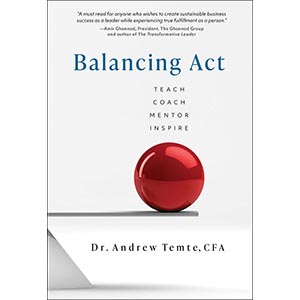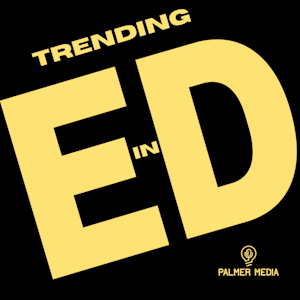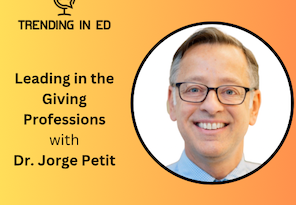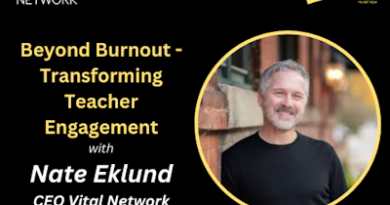The Leadership Balancing Act with Author Andy Temte
Summary

Mike welcomes Dr. Andrew (“Andy”) Temte, President and Global Head of Corporate Learning for Kaplan North America and author Balancing Act: Teach Coach Mentor Inspire. We start by discussing Andy’s non-linear career path, and how he embraces the bumps along the way. We also talk about the importance of the whole person and engaging with the behavioral skills as well as the deep expertise. Andy explains the importance of continuous improvement and organizational health. And how he learned to let go of “command and control” by embracing approaches that teach, coach, mentor, and inspire his team.
If you like what you’re hearing subscriber to Trending in Education wherever you get your podcasts. And check us out at TrendinginEducation.com.
Transcript
Mike Palmer: Welcome to Trending in Education. Mike Palmer here, very excited to be joined again by Dr. Andrew Temte who is the President and Global Head of corporate learning for Kaplan North America. Andy was on Trending in Education in its early days. He’s continued to do really interesting things, including writing a new book called Balancing Act, which is going to be one of the main things that we’re diving into today. But before we get to any of that, I just need to welcome Andy Temte to Trending in Education. Welcome to the show, Andy.
Andy Temte: Thank you, Mike. Really appreciate it. Love being here.
Mike Palmer: Your book, Balancing Act, is in many ways a personal narrative. You’re the protagonist in the book. You’re describing the experiences that you had over a long and successful professional career. That’s typically how we begin the show, we ask for people’s origin story. But since that takes up 206 pages of a quick read, maybe you could give us an abbreviated story of how you got to this point in your life and what drove you to write the book.
Andy Temte: One of the reasons why I wanted to write the book was my path has not been linear. And there are far too many people in this world who have either been convinced or have convinced themselves that life needs to be a set of B comes after A, and C comes after B, et cetera. And that if you’re not following a linear path from high school into college, then your first job, and then the next step up, et cetera, et cetera. Folks can get themselves all worked up about that.
I wrote this book in a very naked and transparent way. You don’t see a lot of executives write in this fashion, because you want to tuck away the challenges and the bad stuff, and put all the good stuff out for public consumption. But that’s not how we learn. That’s not how we grow.
I wanted to write a piece that really laid it all out there, let folks know that it’s completely natural to have loop backs and challenges and winding roads that lead to whatever the definition of success is. I talk a lot about continuous improvement, and continuous improvement is all about finding that next best version of a process, of yourself.
Mike Palmer: It definitely comes through, and the voice is not the typical invulnerable executive declaring what is true and telling you in a very assertive way this is what it is. There is your confidence in there, but there was also almost more confidence in that you’re able to show a lot of your vulnerability and show a lot of reflection on some of the more difficult chapters of your life.
Andy Temte: Vulnerability is a very large part of the book and is a management competency that I really want to get emerging leaders, younger leaders, and folks that have been around the block for 30 years to really think about.
We tend to compartmentalize those things that were challenges and forks in the road and hide them. But things make me who I am. I wanted to be a rock star when I was a teen and I spent the better part of four years on the road with five other sweaty guys living in the same one room hotel,
Mike Palmer: My producer is telling me the name of the band was “Cry Wolf”.
Andy Temte: Yes, that is correct. And look, we had a lot of fun. But there were so many lessons in that work that if I just pretend that didn’t exist, I would miss out on a tremendous opportunity to help myself learn and grow and then help others. Because, if the chief executive of company X was actually a high school dropout, they would probably work pretty hard to put that in their past and focus their attention on their PhD, or their master’s degrees, or whatever.
I am a high school dropout and I’m not at all averse to saying so. And I say that not because I want people to think, “Oh gosh, he’s a high school dropout and Oh boy, that’s terrible.” I want them to think, “Wow. Faced real challenges, meaningful challenges that he was able to learn and grow from breakthrough and find that next best version of himself. And gosh, I know people like that in my life that might be able to learn from that.
Mike Palmer: It’s refreshing, and it does remind me of The Nelson Mandela quote that I quote very frequently on this show, which is “I never lose. I either win or learn.” When you go through those hardships, when you go through those challenges, that’s really where the character development happens.
The other thing that did strike me about the book is that a lot of the trends around teaching character development are very much focused on K-12. What I found somewhat inspiring, And we’ll talk about inspiration in a bit, but what I found somewhat inspiring was that you were incorporating character development and the importance of an ethical compass and balance to the corporate setting. To the idea that if you are a leader in industry, if you’re an executive, there are ways to develop as a whole person that frequently aren’t discussed.
Andy Temte: This concept of real active listening and mindfulness and especially the concept of self-reflection. You were just talking about character and how do we build that through time? A lot of people imagine that character is fixed and set after some period of time, and that character can’t be changed and nurtured. The old phrase, a tiger doesn’t change his or her stripes.
There are some aspects of our fixed selves and our fixed nature that are just part of being the human that we are. But there are a lot of components of who we are that can be nurtured and grown over time. And just because you’re a 57- year old leader with a 30- plus year career behind does not mean that you can’t take meaningful steps forward. Yes, they might need to be in small chunks because our mental agility in our mental flexibility–It gets harder and harder to do, but it doesn’t mean that we should somehow stop trying to find that next best version of ourselves.
Mike Palmer: Frequently, there are other things that you can contribute which I did pick up on throughout the book, which is just your perspective based on stories or examples from your career or your experiences that span quite a range of years. And that was something that made me reflect a little bit on, where am I finding these sorts of insights?
Has this always been your process that you’re reflective and thinking about how to consolidate this into something other people can understand? Or is that storytelling element, which you talk about a lot in the book, is that something where you’ve had an aha moment and began to cultivate a little bit more?
Andy Temte: Fortunately, storytelling has been a big part of my life since I was a young boy. I tell a story in the book about being Arne in the production of I Remember Mama. I was, I dunno, 10 years old or so, and here I am on stage with a bunch of college kids. And you can just imagine how impactful something like that is. I went on to be a singer. And then get into academics, and really flex my muscles as a teacher.
And then as an executive, I found that storytelling is absolutely essential. But the piece, Mike, the piece I didn’t put together until–I don’t want to give anybody the sense that it was too late, because it wasn’t. But I spent far too much of my life imagining that the world of work cared much more about the technical skill that I brought to the table than the blend of the technical with the behavioral,
I actively avoided anything that dealt with trying to really discover what I was feeling inside.I spent a lot of years putting things on the shelf and it, it all came out in my late thirties and early forties as a train wreck, frankly. My wife and I got divorced. And I had convinced myself that you can just shove down those feelings and shove down the behavioral side of things and it all comes out in the wash. It doesn’t come out in the wash. It comes out in really unproductive ways.
If I’m teaching anybody anything through this piece is to really get connected with yourself much earlier in life. And build those muscles of self-reflection, of holistic storytelling and not just the convenient parts, but the whole thing within reason. We don’t want to come into the world of work and have sob stories and burden our coworkers with things. There’s situational awareness and emotional intelligence that you have to bring into all these conversations. Leaders need to lean a lot farther toward the behavioral side of the equation than we are today.
Mike Palmer: I’ve heard it described as human-plus skills. We’re all gonna need the human skills, and then layer in some technical expertise. Maybe even multiple technical expertises. Our work lives are going to be much longer. Just being in your mid- fifties is going to be right in the middle of a long career arc over time.
And it’s going to require a lot of reskilling, up-skilling, playing with your head up. What I think is interesting just to double down on your point, is that frequently, when do you think about re-skilling or up-skilling, you’re not thinking about the emotional tooling or the sort of psychic reserve that you need to be an effective leader.
Andy Temte: Just before this conversation, I was doing some writing on resilience. I’ve been doing a lot of thinking about our egos and how our egos sit at the nexus of a lot of these human skills. Ego is a very misunderstood terminology. When we hear the word ego, we think about the guy or the gal who needs the door widened so that their head can fit through. But that’s just the evidencing of other human behaviors, unproductive human behaviors.
The other part of the ego is that bit of ourselves that mediates between our ideal view of ourselves that was built for us by parents, church, school, just societal expectations. So there’s this ideal of ourselves. And then there’s that bit of ourselves that we were born with and is our base needs and our impulses.
And what’s really at the core of a lot of these human skills is this concept of a strong ego. And having a strong ego is a really good thing because all the concepts that we’ve just been talking about require the ability for somebody to–I introduced the concept of a “half halt” in the book and you just take a little bit of a step back. You take a breath and allow the space for your ego to actually mediate between the part of yourself that’s just going to spin wildly out of control because those are your base feelings and your base position and the anxiety that’s driven by not meeting the expectations of some unachievable version of oneself that you want to try to attain. Having this strong ego is essential for mindfulness and situational awareness and emotional intelligence,
Mike Palmer: I didn’t realize there was a psychoanalytic angle to Balancing Act, but in many ways, the ego does have to balance those forces. And that is a theme that you hit on throughout where there’s always a risk that you almost over-index in one direction. And we’re in an age of extremes. I was struck by your honesty as someone who really pursued those extremes, and then learned the danger there. And then was able to maybe stay more balanced from that point forward.
Can you talk about that? Maybe touch on entropy. I have conversations with educators all the time. There’s this concept of multidimensionalism that comes out in the book.
Andy Temte: I was talking to an educator a couple of weeks ago about multidimensionalism. And this gentleman said, “For all the people in my class, I tell them to focus on one thing and get that one, one thing really right. And be the expert. “And I’m like that’s very 1990.”
Let’s open our minds to the benefits of being multidimensional. And being able to look at a problem in different ways, not just being about one thing. Because when–and this is just my experience–but when I’ve been about one thing, just business or just this, or just that as I say, in the book, it’s a formula for disaster. And opening up
one’s mind, having that mental agility, that is essential. You brought up the concept of entropy, my version of entropy is very simplistic, meaning yeah, in the end, everything falls apart.
Mike Palmer: This is a law of thermodynamics though, right? Like you’re backed up by a century or two of science.
Andy Temte: Yeah, yeah. But my definition is so simplistic the scientists sometimes get mad at me. “Andy, entropy is this, that, and the other thing.” And I’m like, “No, in business it is the concept that a system,
any system, if left unattended, will tend toward disorder versus order.” You simply cannot expect a team left to their own devices to somehow build trust, become cohesive, have structure around them and create excellence in outcomes it just doesn’t happen.
Mike Palmer: I’m the proud father of a two- year old, so you don’t need to talk to me about entropy. So that’s why I was bringing it up, just in case you had any advice. But yeah things tend towards disarray, not just in an organization, but also in the household when yet when you have a small child.
The other thing that I thought was useful in the book is there’s a lot of tips and a lot of frameworks that people can pick up on and maybe start to hang some of their thinking on. There’s an acronym, or I think technically it’s an initialism, TC MI which at first I was trying to decipher it. I was thinking it’s TMI, but that’s “Too Much Information”. What does the C stand for? But it’s not actually that. So can you walk us through what TCMI is?
Andy Temte: Almost 10 years ago now I was formally introduced to the concepts of continuous improvement and organizational health. The concept of continuous improvement, everybody thinks it’s wildly complicated. It is so simple. It is identifying and eliminating waste, respecting your people and having a maniacal focus on your customer. And the focus on your people, that’s where organizational health comes in, developing trust within teams and over- communicating and creating clarity,
But the concept of “Teach, Coach, Mentor, and Inspire.” It came together in a meeting that we’re having. And I just really latched onto those four words. And ultimately, they became the headline in my standard work. I started waking up every day saying, as a chief executive, the main part of my existence in this organization is to teach, coach, mentor, and inspire.
There is no do in there. There is no takeover for everybody else if things start to fall apart. There’s none of that. And it’s a wonderful mental frame for a manager and leader to remind themselves over and over again, that’s your job. It’s not to solve problems for everybody else. But in the coaching part it is to help lead others to the answer and to develop formal mentoring relationships where appropriate and to always take the role of a teacher.
The inspire bit is a little trickier because I don’t think I’ve ever been successful when I’ve woken up and I said to myself, “I’m going to try to inspire somebody today.” It just doesn’t work that way. But if you’re continually teaching, mentoring, and coaching, the likelihood that some level of inspiration is going to happen within a 24 hour period just goes up naturally.
Mike Palmer: Yeah. I was struck by how in many ways you’re looking for that inspiration in others. You talk a lot about the light in people’s eyes where battling the real challenge of disengagement and being checked out. So I think there is a level of, and I’m gonna try not to analogize to the fact that I have a two-year old, but there’s an element of, always looking for the hopeful part of folks’ narratives. I think Reed Hoffman talks about how you want to allow people to be the hero in their own narrative. In a lot of these cases, it’s really letting go of many of the old trappings of hierarchy and command and control. How have you been able to navigate that?
Andy Temte: Again, in the construct of a balancing act and being too far on one side and too far on another side of a spectrum, I was a command and control leader early in my career. There was one way to do things and that was Andy’s way. There was an epiphany that I had in the late two thousands, right around the time of the great recession, where folks would come to me. And with the phrase, “Andy said”. Nothing happens in this company without an “Andy said” attached to it. And at first I was like, “Oh, that’s kinda cool.” And then as I started to open up the box of organizational health and continuous improvement, I was like, “Oh, this is not good at all.”
It took me quite a while to bend the arc from command and control to a more balanced approach because there is such a thing as too many cooks in the kitchen. When everybody’s in charge, no one’s in charge. There are places where decisions have to be made, and as a leader, you have to be decisive and then expect everybody to come on board with you.
But gosh, those command and control environments especially in larger organizations, as the company grows and everybody’s looking around going,” Oh gosh, did Mike approve of that?” And is this something that’s going to be a “Mike said”, if it’s not, then I don’t want to touch it with a 10- foot pole. That just breeds that mistrust within the organization.
Mike Palmer: And you could see how that could slow things down to where your previous point about waste. If everyone needs to get the official order from on high to do anything, suddenly you’re dealing with backlogs and chains of email. That is the other one that I wanted to maybe get a few beats of your rants on email.
Andy Temte: The sub chapter prior to publication was called “Email is the Devil.” the editors strongly recommended that I change it.
Mike Palmer:The Devil’s legal team is tough. So I think that was a smart move.
Andy Temte: They are, they’re really difficult to work with.
The whole point of that section is really talking about one-way communication devices. I give examples about how, Susie and Billy would literally be sitting next to one another in cubicles. And I’m sure you’ve seen this in your career. Never get up and talk to one another, firing off emails to one another.
Early in the program, I mentioned that my wife and I we’re divorced. We’re now happily remarried, by the way. But we were divorced in our forties. And where this really dawned on me was during the therapy process and the process of rejoining where these unhealthy behaviors of, “Oh, I’ll just, pick up my phone and I’ll send Linda a text message and I’ll get my point across.” Zing!
When you do that, when you do that zing, you might as well just stick your fingers in your ears, and do the hear no evil thing because it’s one way, it’s your message to that individual. And there’s really no way to respond in a healthy fashion. Look, email is great. It’s going to be around for a long time. But It is great for corporate announcements and stuff where you got to have large audiences hear all the same thing. But man, it can really cause challenges when you’re just sending barbs, jabs
Mike Palmer: And replying all..
Andy Temte: Yeah. Oh my God. So that’s a whole ‘nother–that’s probably a podcast in and of itself, not even an episode.
Mike Palmer: As we’re getting closer wrapping up here, Andy, I also wanted to get some of your reflections on who should pick up this book and why they should.
Andy Temte: The book is a business book, and there is some heavier-ish business terminology. It is also at the same time purposefully designed to be very approachable. When I do use business terminology, I try to break it down into it’s very simple component parts, so that nearly anybody can pick up the book and get something from it.
Mike Palmer: Just real quick. I’ll vouch for that too, because it does come across as in your heart of hearts, you’re still a rockstar. So it’s more like through the perspective of, “I have to do these other things.” But there is an authentic soul story that you’re telling throughout the book that really does resonate. But anyway, please continue.
Andy Temte: I want this to be a multi-generational piece. I want Gen Zer to pick it up. And I want Millennials to pick it up. And I want my Baby Boomer friends to pick up the book. Because it literally has something for everybody beyond the age of really 18 or 19.
So if you’re an aspiring leader, if you’re an individual contributor who may want to lead people in the future, this book is for you because it’ll lay out a whole bunch of land mines that Andy Tempe stepped on and made a big mess from that you can learn from. All the way to an individual who’s in their early 60s who’s thinking about a career change and wants to adopt a more mentally agile, active listening, modern management stance. This book is for that individual as well.
Mike Palmer: I will say from this Gen Xer’s his perspective, there was plenty to learn. As we’re concluding, Andy if folks want to learn more about the book or if they want to get a hold of the book what should they do? Where should they go?
Andy Temte: The book gets released on April the 6th of 2021. It’s already available for pre-sale on Amazon and Barnes and Noble and several other digital outlets. You can buy it in hardcover to keep around forever, or you can get a digital copy on your Kindle or your Nook. You can get the ebook or the physical hard copy. I might add the cover is phenomenally beautiful. You’re going to want this thing on your shelf because people are just going to go., “Wow, that’s a really nicely done book cover.”
Mike Palmer: It’s a balancing act, in many ways, getting a book like this out. The name of the book is Balancing Act. The name of the author is Andy Temte who’s a real guide for many of us who are trying to figure out how to navigate leadership and our roles and our ability to balance our professional lives with our private lives. And we didn’t even get into some really great insights around navigating the post- COVID world. But Andy, thanks. Thanks so much for joining us today.
Andy Temte: Thank you. Always great to talk to you.
Mike Palmer: And for our listeners, we’ll be back again soon. If you like what you’re hearing, subscribe, tell your friends, this is Trending in Education.




